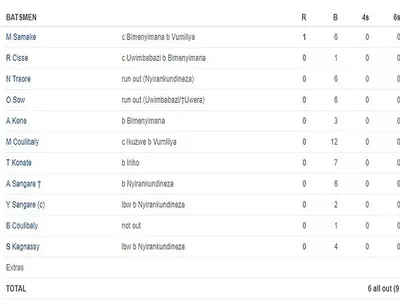Lowest Score In T20 International Cricket

Twenty20 (T20) cricket, known for its explosive batting and high scores, occasionally delivers surprising and dramatic outcomes. Among these is the record for the lowest score in T20 International (T20I) cricket, a dubious distinction that has seen teams bowled out for shockingly low totals. This article delves into the context, records, and memorable moments surrounding the lowest scores in T20I cricket.
The Record for the Lowest T20I Score
As of now, the lowest team score in a T20 International match is held by Turkey, who were dismissed for a mere 21 runs against the Czech Republic on August 30, 2019, during the Continental Cup in Romania. This match highlighted the unpredictable nature of T20 cricket, where even the most experienced teams can falter.
Details of the Match:
- Date: August 30, 2019
- Venue: Ilfov County, Romania
- Teams: Turkey vs. Czech Republic
- Turkey’s Score: 21 all out in 8.3 overs
- Czech Republic’s Score: 27 for 1 in 7.5 overs
Factors Contributing to Low Scores
Several factors can contribute to such low scores in T20 cricket:
- Pitch Conditions: Poor pitch conditions can make batting extremely challenging, leading to low scores.
- Weather: Overcast conditions or dew can affect the pitch and ball behavior, making it tough for batsmen.
- Quality of Bowling: Exceptional bowling performances, especially with early breakthroughs, can dismantle batting line-ups.
- Pressure: The pressure of a chase or the importance of the match can sometimes lead to batting collapses.
Other Notable Low Scores in T20I
While Turkey’s 21 is the lowest, other notable low scores include:
- Lesotho (26 all out): Against Uganda on October 8, 2021.
- Turkey (28 all out): Again, against Luxembourg on August 29, 2019.
- Isle of Man (27 all out): Against Spain on February 26, 2023.
Memorable Low-Scoring Matches
Several low-scoring matches in T20I history have been memorable for their unexpected turn of events:
- India vs. Australia (2014): India were dismissed for 74 runs in the 2nd T20I at Melbourne. Australia chased down the target comfortably, showcasing the importance of disciplined bowling and fielding.
- West Indies vs. England (2019): West Indies were bowled out for 45 runs in the 2nd T20I at Basseterre. England’s bowlers, led by Chris Jordan, exploited the conditions perfectly to achieve this feat.
The Impact of Low Scores
Low scores in T20I cricket serve as a reminder of the sport’s unpredictability. They underscore the importance of adaptability and resilience in the shortest format of the game. These matches often highlight exceptional bowling performances and can sometimes lead to significant changes in team strategies and compositions.
Conclusion
While T20 cricket is celebrated for its high scores and big hits, the occurrences of low scores add an element of unpredictability and excitement to the game. The record for the lowest score, held by Turkey with 21 runs, stands as a testament to the challenging nature of cricket, where conditions, pressure, and skill levels can converge.
The Challenges of Labeling a “Worst Cricketer”
Cricket, particularly in the T20 format, is a game of uncertainties and fine margins. It is characterized by its fast pace, intense pressure, and the need for quick decision-making. Labeling someone as the “worst cricketer” in this format is a subjective and controversial exercise, as every player at the international level has demonstrated significant skill and dedication to reach that stage. However, discussing underperformances can provide insights into the challenges players face in T20 cricket.
The Nature of T20 Cricket
T20 cricket is unique due to its short format, where each team has only 20 overs to score as many runs as possible and to restrict the opponent. This format requires players to adapt quickly, often stepping outside their comfort zones. Success and failure can be stark, and the margin for error is minimal. A few poor performances can severely affect a player’s reputation, but it’s essential to recognize the broader context of their career and contributions.
Case Studies of Struggles in T20 Cricket
Rather than labeling a player as the “worst,” it’s more constructive to examine instances where talented cricketers have struggled to find their footing in T20 Internationals. These examples illustrate the format’s demanding nature.
1. Dinesh Chandimal (Sri Lanka)

Dinesh Chandimal, a talented batsman and occasional wicketkeeper for Sri Lanka, has had a challenging T20I career despite his success in other formats.
Statistics:
- Matches: 62
- Runs: 973
- Average: 19.86
- Strike Rate: 104.12
Chandimal’s relatively low strike rate in T20Is has been a point of criticism, especially in a format that demands quick scoring. His struggle to adapt to the rapid pace of T20 cricket highlights the difficulty even skilled players face in this format.
Biography
Dinesh Chandimal, a prominent Sri Lankan cricketer, has carved a niche for himself with his versatile batting and dependable wicketkeeping skills. Born on November 18, 1989, in Balapitiya, Sri Lanka, Chandimal’s journey to international cricket began with his exceptional performances in domestic cricket, which soon earned him a place in the national team. Known for his composure and technical proficiency, he has been a crucial player for Sri Lanka across all formats. Although his T20I career has seen ups and downs, with a relatively low strike rate and average, Chandimal’s resilience and leadership qualities, exemplified during his tenure as captain, have been invaluable to the team. His ability to anchor the innings and perform under pressure has often provided stability to Sri Lanka’s batting lineup, making him a respected figure in the cricketing world.
2. Alok Kapali (Bangladesh)

Alok Kapali, once a promising all-rounder for Bangladesh, also struggled in the T20 format.
Statistics:
- Matches: 18
- Runs: 124
- Average: 10.33
- Strike Rate: 104.20
- Wickets: 5
- Bowling Average: 59.80
Kapali’s inability to make a significant impact with either bat or ball in T20Is showcases the challenges of excelling in all-round roles in this format.
Biography
Alok Kapali, a versatile cricketer from Bangladesh, has had a career marked by both promise and challenges. Known for his skills as an all-rounder, Kapali made significant contributions in various formats of the game. He gained attention early in his career for his leg-spin bowling and middle-order batting. Despite his potential, Kapali struggled to maintain consistency, particularly in the T20 format. His T20 International statistics, including a batting average of 10.33 and a bowling average of 59.80, reflect these challenges. However, Kapali’s career also includes highlights such as his hat-trick in a Test match against Pakistan in 2003, making him the first Bangladeshi bowler to achieve this feat. This blend of highs and lows underscores the unpredictability and demanding nature of international cricket.
3. Yuvraj Singh (India)

Though Yuvraj Singh is remembered for his extraordinary performances, including hitting six sixes in an over during the 2007 T20 World Cup, his overall T20I career had inconsistencies.
Statistics:
- Matches: 58
- Runs: 1177
- Average: 28.02
- Strike Rate: 136.38
While these numbers are respectable, Yuvraj faced criticism during the 2014 T20 World Cup final, where his slow innings was partly blamed for India’s loss. This instance underscores how a single underperformance can overshadow a player’s otherwise illustrious career.
Biography
Yuvraj Singh, a legendary figure in Indian cricket, is celebrated for his explosive batting, exceptional fielding, and invaluable contributions to some of India’s most memorable cricketing victories. Born on December 12, 1981, in Chandigarh, Yuvraj burst onto the international scene with his powerful hitting and agile fielding. His career-defining moments include the 2007 ICC T20 World Cup, where he famously hit six sixes in an over against England, and the 2011 ICC Cricket World Cup, where he played a pivotal role in India’s triumph, earning the Player of the Tournament award. Despite battling a serious illness, Yuvraj’s resilience and determination saw him return to cricket, inspiring millions. His career, marked by numerous match-winning performances, highlights not only his skill and talent but also his unwavering spirit and commitment to the game.
Understanding the Context
Cricket is a sport that involves numerous variables, including pitch conditions, opposition strength, and match situation. A player’s performance can be affected by factors beyond their control, making it unfair to label them as the “worst” based on statistics alone.
The Pressure of International Cricket
The intense scrutiny and pressure of international cricket can impact players’ performances. Fans and analysts often have high expectations, and a few poor games can lead to harsh judgments. However, it’s essential to appreciate the hard work and talent required to play at the international level.
Conclusion
Labeling a cricketer as the “worst” in T20 cricket does not capture the complexity and challenges of the sport. While some players may struggle to adapt to the T20 format, this should not overshadow their achievements in other formats or the dedication they have shown throughout their careers. Instead of focusing on the “worst,” it’s more constructive to understand the difficulties players face and appreciate the efforts they make to overcome them.




